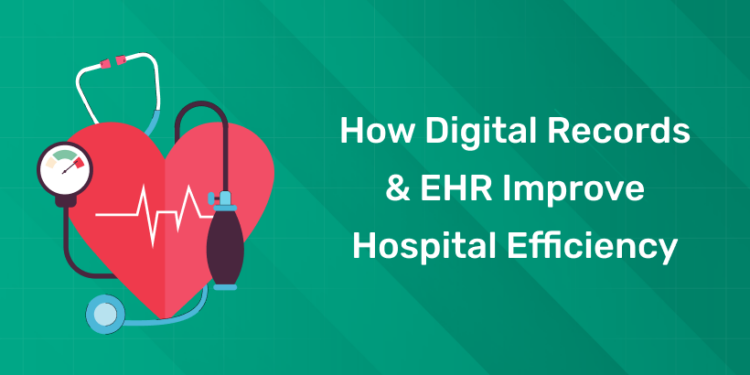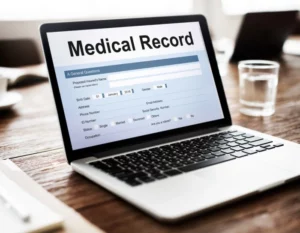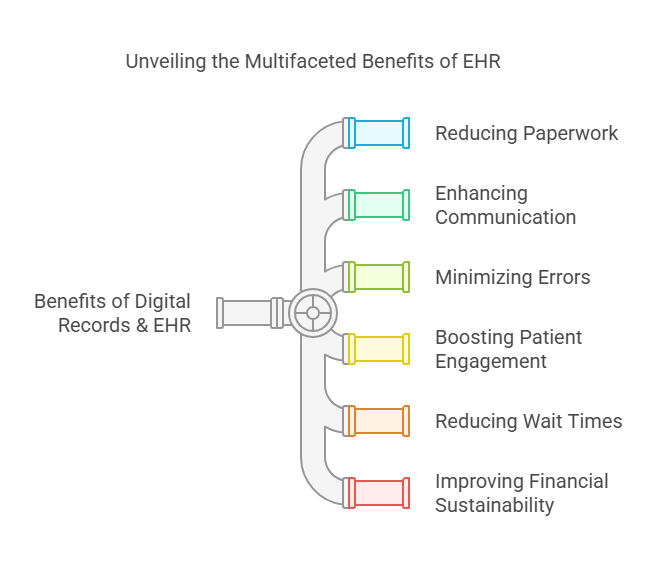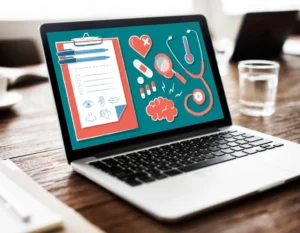Table of Contents
Key Takeaways:
- EHRs eliminate paperwork, making hospital operations more efficient and error-free.
- Digital records create secure, real-time access to patient histories—leading to safer, more coordinated care.
- Automated workflows reduce hospital costs, boost revenue cycles, and free staff for patient-focused tasks.
- Analytics and AI-powered systems are shaping smarter, data-driven hospital management.
- EHR is the cornerstone for hospitals embracing digital transformation, ensuring future-ready healthcare services.
Introduction
Imagine walking into a hospital where your doctor already knows your medical history, allergies, and recent test results—without flipping through stacks of paper or waiting for files to be retrieved. In today’s healthcare landscape, this is no longer a dream but a reality for millions, thanks to digital records and Electronic Health Records (EHR). Hospitals are under constant pressure to deliver faster, safer, and more personalized care, and EHRs are at the heart of this transformation.
For patients, it means less waiting, fewer errors, and more control over their health. For healthcare professionals, it means streamlined workflows, better communication, and more time to focus on what matters most—patient care. Let’s explore how EHRs are revolutionizing hospital efficiency and what this means for the future of healthcare.
What Are Electronic Health Records (EHR)?
1: What is the primary role of a hospital administrator?
EHRs are digital versions of patient medical records, storing everything from diagnoses and medications to lab results and imaging reports. They are accessible in real time by authorized healthcare providers, making care coordination seamless and secure.
Also read: What are Electronic Medical Records?
Explore Your Future in Hospital Administration! Enroll now
Why It Matters
Unlike paper records, EHRs eliminate the risk of lost files, illegible handwriting, and delays in accessing critical information. They also integrate with billing, pharmacy, and lab systems, ensuring that every aspect of patient care is connected and up to date.
Tip: EHRs allow doctors to instantly view your entire medical history, making follow-ups and treatment adjustments much smoother.
Hospital Administration Course with Assured Career Growth
Hospital Administration Course by Entri App: Master essential healthcare management skills, gain certification, and secure top roles in leading hospitals
Join Now!How Do EHRs Improve Hospital Efficiency?
1. Efficient Patient Data Management
EHRs make patient information instantly accessible to authorized staff, eliminating the need for paper charts and manual updates. This leads to faster, more accurate diagnoses and treatments.
- Doctors can access patient records from any location, reducing delays in care.
- Real-time updates ensure that all providers see the most current information.
- Automated alerts notify staff of critical changes, such as new test results or medication updates.
Stat: 86% of healthcare providers report faster access to patient records with EHRs, and 75% say it improves overall efficiency.[1]
2. Enhanced Communication and Coordination
EHRs enable real-time data sharing between departments, specialists, and labs, minimizing test duplication and communication errors.
- Secure messaging features allow instant communication between doctors, nurses, and specialists.
- Telemedicine integrations enable remote consultations with full access to patient histories.
- Care teams can coordinate more effectively, ensuring that every patient receives consistent, high-quality care.
Tip: Many hospitals use EHR-based messaging for instant updates, reducing the risk of miscommunication.
You might also like: EMR vs EHR vs HMS
3. Minimizing Medical Errors
Automated EHR alerts warn staff of allergies, unsafe prescriptions, or dosing issues, while standardized documentation reduces mistakes from misreading handwriting or missing details.
- Clinical decision support tools guide physicians with evidence-based treatment protocols.
- Automated alerts help prevent medication errors and adverse drug interactions.
- Standardized digital records ensure that all providers follow the same guidelines, reducing the risk of misinterpretation.
Stat: EHRs reduce medication errors by up to 48% and improve patient safety significantly.[2]
4. Streamlined Workflow and Time Savings
EHRs automate repetitive admin processes—like appointment scheduling, prescription refills, and billing—so healthcare staff can focus more on patients and less on paperwork.
- Automated appointment reminders reduce no-shows and improve patient engagement.
- Digital templates and voice recognition speed up documentation, saving physicians an average of 5 hours per week.[3]
- Real-time tracking of hospital resources, such as bed availability and equipment usage, improves service delivery.
Explore Your Future in Hospital Administration! Enroll now
5. Lowering Hospital Costs
Hospitals using EHRs save on paper, storage, and redundant medical tests. Automated billing improves reimbursement cycles and cuts unnecessary spending—making hospitals more financially secure.
- EHRs reduce administrative costs by up to 25% and cut down on duplicate testing by 30%.[4]
- Automated billing and insurance claims processing improve revenue cycles and reduce errors.
- Optimized staffing and scheduling reduce operational inefficiencies, leading to significant cost savings.
Stat: Healthcare facilities can save up to $5 billion annually with EHR adoption.
Real-World Impact: Analytics, Engagement, and Compliance
- Data-Driven Decisions: Hospitals use EHR data for predictive analytics, like forecasting patient surges and identifying disease trends to better allocate resources.
- Patient Engagement: Patient portals allow easy access to health records, online appointment booking, and direct communication with providers.
- Regulatory Compliance: EHRs help hospitals meet regulations (like HIPAA) through secure record-keeping, audit logs, and automated reporting, minimizing legal liabilities.
- Mobile Access & Telemedicine: Providers use mobile-friendly EHRs for on-the-go updates and remote consultations—expanding care to more patients even in rural areas.
People also read: What is Hospital Information Systems?
EHR Impact: Key Statistics Table
| Benefit | Statistic/Impact |
|---|---|
| Faster access to records | 86% of providers report faster access |
| Reduced medication errors | Up to 48% reduction |
| Cost savings | Up to $5 billion annually |
| Fewer hospital readmissions | 30% reduction |
| Increased patient engagement | 60% rise in engagement |
| Time saved by physicians | 5 hours per week |
| Reduced duplicate tests | 30% decline |
| Improved chronic disease mgmt | 25% improvement |
| Administrative cost reduction | Up to 25% |
Hospital Administration Course with Assured Career Growth
Hospital Administration Course by Entri App: Master essential healthcare management skills, gain certification, and secure top roles in leading hospitals
Join Now!What’s Next for EHR? (Future Trends)
- AI & Machine Learning: Hospitals are deploying AI to spot high-risk patients earlier and personalize treatment plans.
- Interoperability: Modern systems enable data exchange among hospitals, clinics, insurance providers, and even wearable devices, ensuring continuity of patient care.
- Blockchain: Emerging for secure, tamper-proof medical records and transparent data-sharing.
- Voice Recognition: Doctors are increasingly using voice-to-text and NLP to quickly and accurately capture notes.
Also read: The Future of Healthcare
Explore Your Future in Hospital Administration! Enroll now
Ready for a Career in Hospital Administration?
If you’re inspired by how technology is reshaping healthcare, why not lead the change? The Entri Hospital Administration Course is expertly designed for future hospital leaders:
- Comprehensive modules on digital records, EHR management, hospital operations, finance, HR, and compliance
- Hands-on projects, case studies, and updated content based on the latest healthcare trends
- Direct placement assistance with leading hospitals, ensuring your skills are in demand the moment you graduate
- Guidance from experienced instructors and access to a vibrant learning community
Take your first step to a rewarding hospital administration career—join Entri and get ahead in a rapidly evolving industry.
Conclusion
Digital records and EHRs don’t just speed up paperwork—they transform how hospitals work, how patients receive care, and how healthcare professionals manage critical information. This digital leap is not only about convenience but about creating safer, smarter, and more personalized healthcare for all.
Dreaming of making a difference in hospital leadership or healthcare management? Enrol in Entri’s Hospital Administration Course and position yourself at the technology-driven heart of the medical field. Embrace the future—your career, and patient lives, will benefit.
Hospital Administration Course with Assured Career Growth
Hospital Administration Course by Entri App: Master essential healthcare management skills, gain certification, and secure top roles in leading hospitals
Join Now!Frequently Asked Questions
What are Electronic Health Records (EHR), and how do they differ from traditional paper records?
EHRs are digital versions of a patient’s medical history, including diagnoses, medications, and treatment plans. Unlike paper records, EHRs provide real-time access, allowing seamless data sharing among healthcare providers. They eliminate inefficiencies such as misplaced files and illegible handwriting. EHRs also integrate with billing, lab, and pharmacy systems for streamlined operations. This leads to improved accuracy, faster decision-making, and better patient care.
How do EHR systems improve hospital workflow and efficiency?
EHRs automate administrative tasks like scheduling, billing, and documentation, reducing workload. They enable quick patient check-ins, real-time access to records, and seamless data transfer between departments. Automated alerts and reminders help in managing appointments and follow-ups. Nurses and doctors spend less time on paperwork and more time on patient care. This results in increased hospital productivity and reduced wait times.
How does EHR enhance patient safety and reduce medical errors?
EHRs provide automated alerts for drug interactions, allergies, and incorrect dosages. Standardized digital records eliminate errors caused by illegible handwriting or missing information. Clinical decision support tools guide physicians toward evidence-based treatment plans. Real-time monitoring helps detect complications early, reducing adverse events. This ensures safer and more effective patient care.
How does EHR improve communication among healthcare professionals?
EHRs store all patient records in a centralized system accessible to authorized staff. Secure messaging features enable direct communication between doctors, nurses, and specialists. Real-time data sharing prevents miscommunication and duplicate testing. Telemedicine integrations allow remote consultations with full access to patient histories. These features improve coordination and streamline patient care.
How do EHR systems help reduce hospital costs?
EHRs lower expenses by eliminating paper records, storage, and administrative overhead. Automated billing and insurance claims improve revenue cycles and reduce errors. They prevent duplicate tests and unnecessary procedures, cutting waste. Optimized staffing and scheduling reduce operational inefficiencies. These cost-saving measures enhance the hospital’s financial sustainability.
Can EHR improve patient engagement and satisfaction?
Yes, EHRs provide patient portals for accessing medical records, booking appointments, and requesting prescription refills. Secure messaging allows direct communication with doctors, improving transparency. Automated reminders enhance adherence to treatment plans. Reduced wait times and streamlined care improve the patient experience. Empowered patients make informed decisions about their health.
How does EHR contribute to data-driven decision-making in hospitals?
EHRs collect vast amounts of patient data for analysis and trend identification. Predictive analytics help hospitals anticipate disease outbreaks and resource needs. Data-driven insights improve treatment strategies and hospital efficiency. Real-time monitoring enables early intervention for high-risk patients. Hospitals can make informed, evidence-based decisions for better patient care.
What security measures do EHR systems use to protect patient data?
EHRs use encryption, access controls, and multi-factor authentication to secure records. Audit logs track who accessed or modified data, ensuring accountability. Regular system updates patch vulnerabilities and prevent cyber threats. Compliance with regulations like HIPAA protects patient privacy. These measures safeguard sensitive medical information from unauthorized access.
What role does Artificial Intelligence (AI) play in EHR systems?
AI automates documentation, reducing manual data entry for healthcare providers. It enhances diagnoses by analyzing patient records and recommending treatments. Predictive analytics help identify high-risk patients for early intervention. AI-driven chatbots assist with appointment scheduling and patient inquiries. These advancements improve efficiency, accuracy, and overall healthcare outcomes.
What does the future hold for EHR in healthcare?
Future EHR advancements will focus on greater interoperability between healthcare providers. Blockchain technology will enhance security and prevent data tampering. Telehealth and remote monitoring integrations will expand access to care. AI-driven insights will enable more personalized and efficient treatments. These innovations will continue transforming healthcare for better efficiency and patient outcomes.
















